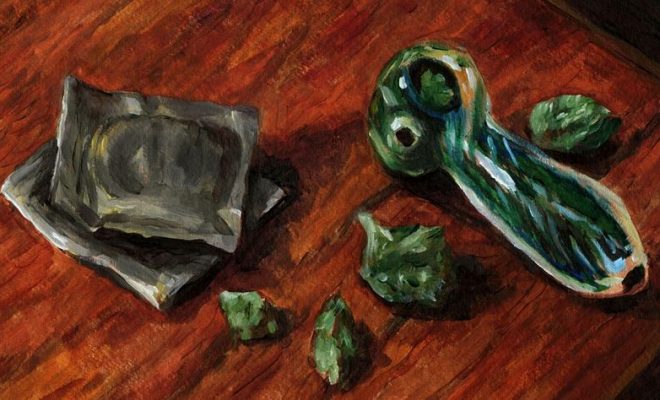No, Being Open and Being Vulnerable Aren’t the Same Thing—Here are 4 Key Differences

I don’t know who needs to hear this (or if the headline tipped you off) but being open is not the same as being vulnerable. Being open isn’t a bad trait by any means—openness can make you more open-minded to ideas, to adventures, to life. But openness in the guise of vulnerability is tricky. It’s the the intentional shouting of things that might be considered taboo or not typically disclosed, but you’re the alpha in a social power dynamic when you’re “open.” What does it mean to be vulnerable, then?
Vulnerability is a sacrifice of comfort, of the ego, allowing yourself to be potential prey to emotional velociraptors. So yeah, that sounds scary. But there’s a major relationship payoff: Vulnerability is the catalyst to true intimacy, that thing we all crave, that thing that makes us feel, in a round-about way, safe.
“True intimacy demands vulnerability,” says Carla Marie Manly, PhD, clinical psychologist and author of Joy From Fear. “It’s by sharing our innermost selves with another loving, safe soul that we build trust, safety, and the deepest of connections. When we are vulnerable with another person, we are saying, ‘Here I am; this is me. Do you love me? Do you accept me for all that I am?’”
It makes sense, then, that people would want to retain a sense of power and control in their relationships by volunteering information versus revealing it. Look, we’re a big fan of boundaries here, boundaries are what keep us mentally well. But thinking you’re vulnerable when you’re actually just a selective oversharer doesn’t do you or your loved ones service. Allowing room to be vulnerable will set you free.
“When these often-silent questions are met with unconditional love, acceptance, and integrity, the bond of intimacy—and the depth of the relationship—grows,” says Dr. Manly. “Being vulnerable requires a willingness to give access to one’s most sacred and sensitive inner spaces.”
4 key differences to look for when it comes to vulnerability vs. openness
1. Vulnerable: Someone who can talk frankly about the nitty gritty of their personal life
Openness, by definition, is the capacity to be candid with others, and a person can be very open about their work life, hobbies, and general interests, bowel movements, sexual fetishes, drug addictions, whatever. But they might be impenetrable on an emotional level. Conversely, “a vulnerable person will engage in open, honest conversations about important goals, needs, and hurts,” says Dr. Manly.
2. Open: Someone who sets up walls when questioned about their personal life
It’s suspect when someone has an “ask me anything” attitude on a dating app, and then puts up walls when faced with personal questions. Not fences, walls. “An open yet emotionally guarded person will often become very defensive around topics that are sensitive,” Dr. Manly says.
3. Vulnerable: Someone who’s introverted, yet willing to connect when trust is earned
Just because you’re not talking all the time doesn’t mean you won’t talk when the time comes. Typically speaking, introverts have rich inner worlds that they’d love to share, and they actually excel when bonding with others. “Reserved people may be slow to share their inner worlds, but when they feel safe, they will be honest and deeply vulnerable,” Dr. Manly.
4. Open: Someone who’s great in groups, but bad with heart-to-hearts
This isn’t as cut-and-dry as it sounds, so let’s illustrate again. You know those life-of-a-party people who can dazzle a room and talk to everyone? (I picture someone with real Penny Lane energy.) This person might be able to entertain a crowd and even charm in a one-on-one sitch. But if they can’t look someone in the eye and reveal who they really are—down to their age and real name—then they’re not really vulnerable. “An extroverted, charismatic person may be very open in social settings yet, when it comes to intimate situations, fear can trigger a shut-down response,” says Dr. Manly.
How to allow yourself to be vulnerable if you notice you’re just being open
So now that you’ve taken a beat, maybe you’ll notice that you’re really a novice when it comes to vulnerability. No worries—learning to be vulnerable takes time and bravery, especially if it’s being built upon a foundation of betrayals or emotional trauma. As Dr. Manly points out, those with difficult childhoods often struggle with being safely vulnerable later in life.
Here’s something interesting, though. If you’re able to be wide open and struggle with vulnerability, you actually want to dial back what and how you share parts of your life. “For those who want to be vulnerable—not just open—it’s important to learn how to create healthy boundaries,” says Dr. Manly. “Much like locks on a front door, healthy boundaries help us differentiate between those who are safe and trustworthy and those who are not. As safe people earn our trust, we can then choose to be vulnerable with them by giving them the ‘keys’ to the door of our sacred inner spaces.”
How to encourage someone else to be vulnerable
Maybe you’re on the opposite end of this issue; someone in your life is awesome at sharing Netflix accounts and updates on their yeast infection, but builds up emotional walls. What’s important (and a little frustrating) to understand is that vulnerability is created by safe and consistent interactions over time. Your challenge will be about cultivating a safe space…and encouraging the other person along the way.
“If you notice someone being fearful of vulnerability, you can kindly mention what you’ve noticed and then proceed to assure the person—through both actions and words—that you are a safe, trustworthy, nonjudgmental individual,” says Dr. Manly. “Over time, the untrusting individual will learn that you are a person of your word, and that their vulnerabilities are safe with you. It’s through these very interactions that trust is built and the stage is set for an increase in vulnerability.”









